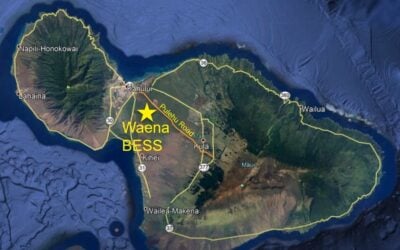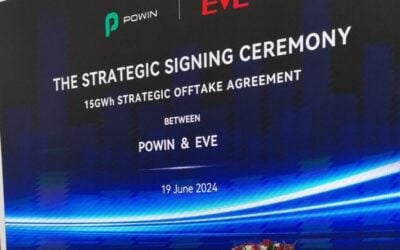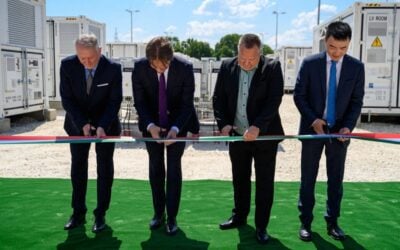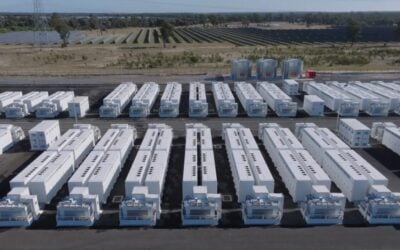Tesla's diversification into stationary storage has brought many column inches - and much debate - in the media. Image: Tesla.
A gold exploration and mining company has agreed to purchase a potential site for excavating lithium in Nevada, citing the “great deal of attention” brought onto the state by Tesla’s decision to locate its mammoth manufacturing facility there.
The EV-maker’s decision to go into stationary storage, officially confirmed at the end of April, followed a period in which Tesla was supplying its partner SolarCity with battery-based energy storage in a number of pilot projects for houses and for the installer’s DemandLogic commercial solution.
Enjoy 12 months of exclusive analysis
- Regular insight and analysis of the industry’s biggest developments
- In-depth interviews with the industry’s leading figures
- Annual digital subscription to the PV Tech Power journal
- Discounts on Solar Media’s portfolio of events, in-person and virtual
The confirmation brought high-profile attention onto the energy storage industry, sparking mainstream media interest. By that point, it was already well known that Tesla was building a “Gigafactory” in Nevada and the announcement of the launch of Powerwall, for houses, and PowerPack for the commercial and utility-scale markets merely confirmed the company's ambitions beyond EVs. The Gigafactory’s planned “500,000 battery packs by 2020” of production would be soaked up by stationary storage too.
In the final week of August this year, Tesla signed a conditional long-term lithium hydroxide supply deal with Canadian company Bacanora and British company Rare Earth Minerals. Bacanora is a minerals explorer, while Rare Earth Minerals owns Sonora Lithium Project, aiming to develop a “low-cost”, “sustainable” mining project in Northern Mexico based on clay deposits, in collaboration with Bacanora.
The Sonora mine does not yet exist, but could yield between 35,000 and 50,000 tonnes of lithium deposits annually if successful, which would include the lithium hydroxide useful to Tesla for making batteries, as well as lithium carbonate. The deal will be extended and scaled up contingent on the mine’s ability to meet Tesla’s forecasted and actual output from its Gigafactory, pencilled in to be up and running by 2017. The two Sonora project partners will need to find debt or equity to finance such operations, with Tesla permitted under the deal to participate in financing activities.
Tesla has moved into utility-scale storage as well as residential. Image: Tesla.
The gold rush
In the short term, the deal appears to have caused some consternation in Nevada following its reporting in local news outlet, Las Vegas Sun. There was dissatisfaction that following tax breaks given to Tesla as an incentive to develop the Gigafactory worth as much as half a billion dollars, the lithium to supply the facility could be outsourced from Mexico. One local politician, Democrat state senator Tick Segerblom, even tweeted, “Tesla to get lithium from Mexico – where’s Trump when you need him?”
Following the Sun’s story, Tesla CEO Elon Musk tweeted that press interest in the story was “unwarranted” as the lithium deal was “not exclusive” and had “many contingencies”. In response to a tweeted enquiry from a Las Vegas Sun journalist, the tech entrepreneur confirmed that Tesla would “definitely” be interested in talking to local suppliers of lithium feedstock. According to the Sun’s sources, developing lithium mines in the US is a lengthy process taking as much as 10 years, while lithium mining operations already located in Nevada are either too small or nearing the end of their planned lifetime.
Against this backdrop, a gold mining company in Nevada appears to have been spurred on by the growing interest created by Tesla to invest in a lithium extraction operation in its home state.
Nevada Sunrise Gold Corporation announced on 2 September that it has “entered into a letter agreement for an option to purchase” Neptune, in Esmeralda County, which is in Nevada’s Clayton Valley. The company believes it could hold lithium brine deposits in subterranean aquifers, owing to studies and reports made of the local area. Once a definitive agreement has been signed to develop the site, including approval by regional stock market TSX Venture Exchange, after three years, the gold extraction company will have the option to purchase 1% of the mine’s gross overriding royalty (GOR, the amount of profit raised by mining and sale of lithium), for US$1 million.
Coincidentally, American Vanadium, a Canada-headquartered maker of vanadium redox flow battery-based energy storage systems, is currently trying to develop a mine for its raw materials in Nevada. It is likely to take several years to complete, if successful. In a 2014 interview with PV Tech Storage, American Vanadium CEO Bill Radvak referred to the vanadium in a flow battery constituting around 40% of its costs.
“We went around and talked to everybody and said “what we’ll do from our mine in the long run, when volumes are up, is we’ll give you a stable price and a long-term secure supply and so we’ll de-risk your future growth,” Radvak said.






